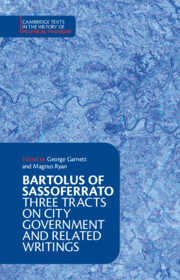Book contents
- Frontmatter
- Dedication
- Contents
- Preface
- Introduction
- Translators’ Note
- List of Abbreviations
- Glossary
- Biographies
- Further Reading
- Note on Scriptural References
- Map of Northern Italy c. 1350
- Texts
- On Guelfs and Ghibellines
- On the Government of a City
- On the Tyrant
- Appendix I: The Preface to Bartolus’s Tiberiadis
- Appendix II: Legislative Autonomy and the Universality of the Roman Empire
- Appendix III: The “City, Emperor unto Itself”
- Index of Legal Citations
- General Index
- Cambridge Texts In The History Of Political Thought
On the Tyrant
from Texts
Published online by Cambridge University Press: 14 November 2024
- Frontmatter
- Dedication
- Contents
- Preface
- Introduction
- Translators’ Note
- List of Abbreviations
- Glossary
- Biographies
- Further Reading
- Note on Scriptural References
- Map of Northern Italy c. 1350
- Texts
- On Guelfs and Ghibellines
- On the Government of a City
- On the Tyrant
- Appendix I: The Preface to Bartolus’s Tiberiadis
- Appendix II: Legislative Autonomy and the Universality of the Roman Empire
- Appendix III: The “City, Emperor unto Itself”
- Index of Legal Citations
- General Index
- Cambridge Texts In The History Of Political Thought
Summary
Bartolus analyses the problem of tyranny according to biblical, Aristotelian, and legal authority. Starting from Pope Gregory the Great’s definition of the tyrant as one who rules without right in the commonwealth, Bartolus distinguishes between a tryant for want of just title, and a tyrant who possesses such just title but is tyrannical in his exercise of power. He is particularly interested in the validity or otherwise of legal transactions conducted by tyrants, and by those living under tyranny, and in how to prove by convincing legal means that a tyranny is or was in existence. The concept of fear, which invalidates certain legal agreements if proved, plays a major role in his argument here. He is especially interested in ‘veiled’ or covert tyrants, who have satisfied the legal formalities for legitimate government but are nonetheless tyrants. This leads him to explore the mechanics of popular election. Bartolus complicates the matter by noting that even legitimate governments need to behave in ways defined as tyrannical by Aristotle, and uses the concept of the common good as the ultimate criterion between legitimate and tyrannical rule.
Information
- Type
- Chapter
- Information
- Bartolus of SassoferratoThree Tracts on City Government and Related Writings, pp. 34 - 64Publisher: Cambridge University PressPrint publication year: 2024
